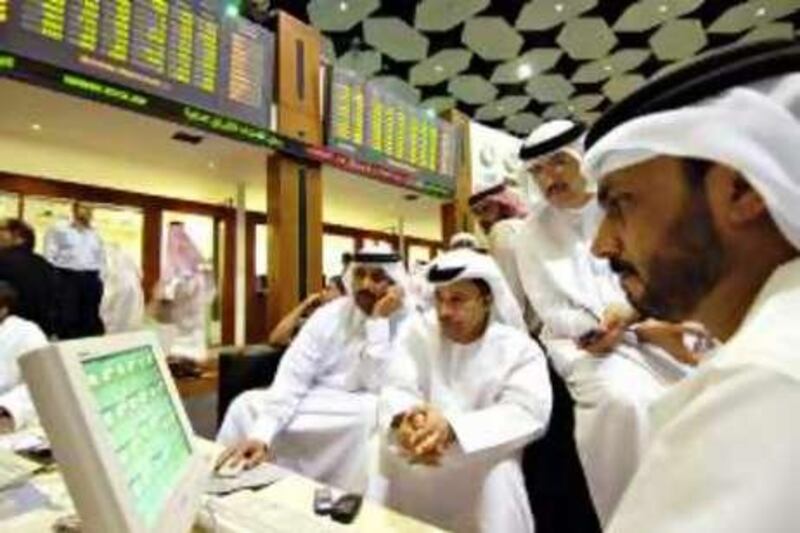While America's markets plummet, formerly moribund Arab economies are thriving after embracing the same principles that Washington carelessly discarded, writes Stephen Glain.
In 2002, I wrote a story for an international news magazine about how over-regulation and primitive capital markets were starving the Arab economy of liquidity. Unless the region embraced something called the Washington Consensus - the neoliberal formula of free trade and economic reform that had worked so well for America - the Middle East would soon face economic collapse.
Today, Arab economies are thriving and - along with East Asia - keeping what's left of the global economy afloat, in no small part because they did open their markets. But the Washington Consensus, or at least a caricature of it, is as radioactive today as the US debt crisis that threatens to contaminate the global economy. Neoliberal reforms are, in many minds, indistinguishable from the greed-is-good orthodoxy that fired Wall Street recklessness and gave intellectual cover to its deregulation. Even the head of the Securities and Exchange Commission has dubbed voluntary regulation a failure, an implicit acknowledgement that the blame for the worst economic crisis since the Depression can be laid at the feet of the last quarter-century of aggressive financial liberalisation. Now it seems only a colossal investor bailout - the very antithesis of neoliberalism - can avert a collapse.
But conflating the Washington Consensus with Wall Street's excesses is unfair. Coined by an economist in 1989 to encapsulate the policy recommendations then being made for Latin America, the ten-point summary included such conservative principles as fiscal restraint, privatization and the elimination of subsidies and import barriers. The deregulation of capital flows - widely regarded as the viral agent behind modern economic crises from the Asian meltdown to the current implosion - wasn't even on the list. But since then, Washington has relieved Wall Street of one financial regulation after another while peddling free-trade deals designed to open foreign markets for American goods as an end in itself, rather than a means to wealth creation on both sides.
In that sense, the sins of Wall Street and its enablers in Washington were more of omission than commission. When discretionary spending rises by 35 per cent under a Republican president, as it has under George W Bush, it is clear fiscal discipline has become as quaint a notion as the Geneva Convention's anti-torture strictures. When Bush knuckled under in an election year and passed subsidies for steel producers - a move declared illegal by the World Trade Organisation - it sent a signal to Wall Street that Washington had no intention of following its own advice. So a distinction must be made between the fertile loam of neoliberalism and the parasitic sort of growth that has been allowed to obscure it.
Even so, many countries that defied America and its free-market nostrums appear to be the better for it. The Malaysian prime minister Mahathir bin Mohamad's insulated his country from the worst of the Asian crisis by imposing capital controls in contravention of the Consensus. And the success of hybrid economies, marked by active state intervention, in countries like China, Russia and Brazil suggest it is now capitalism's turn on the rim of history's dust bin.
But if the moment of the free market has passed, why is it thriving in the once-parched Arab economy? As the developed world slumps toward recession and emerging heavyweights like China and India decelerate, the economies of the Middle East and North Africa are forecast to grow this year by 6.2 per cent, according to the Economist Intelligence Unit, more than twice the global rate. While the petro-states of the Gulf are anticipating 7.1 per cent growth, far less-endowed Arab countries should manage a respectable 4.7 per cent. Record oil prices have sustained the region's growth, but they're only part of the story: the boom has been accompanied by a genuinely neoliberal surge in direct foreign investment, rising non-oil export sales, floating currencies and expanding inter-regional trade.
The convergence of the Middle East and the ever-expanding economies of East Asia is creating a seismic shift in global commerce. While both developed and emerging markets once responded in lockstep to consumer demand from America, an evolving Sino-Arab bloc is providing an alternative to the traditional growth centres of the West. As bad as things look - and if US Treasury Secretary Henry Paulson's mad scramble for a bailout is anything to go by, it must be very bad indeed - they would be a lot worse had Arab economies not launched their reform campaigns when they did.
Take Syria, ostensibly the faithful custodian of Ba'ath Party socialism. This month, the country's flagship air carrier, Syrianair, announced it was hammering out a multibillion dollar deal with Airbus for dozens of new passenger jets. The negotiations are not only a jab at US hegemony (Syria is, after all, on the State Department's list of terrorist regimes and thus heavily sanctioned by Washington); they also reveal an important new cross current in a global trade that until now flowed in one direction. At a time when American airlines are furloughing their fleets, reducing schedules, or filing for bankruptcy altogether, Arab carriers like Syrianair are ambitiously extending their reach. The growth in air traffic between the Arab world and East Asia is only one example of how Sino-Arab intercourse is keeping major industries alive despite the turbulence elsewhere. And it is no coincidence that Syria, though certainly no political protégé of America's, has been an assiduous student of the Washington Consensus as originally conceived.
In a country where commercial banks hardly existed less than five years ago, Syrians can now withdraw up to $10,000 in local currency from their own accounts and invest it in foreign exchange. Damascus has eliminated its "negative list" of goods that could not be imported into the country, once used by local manufacturers to lock out imports, and it is welcoming foreign investment. The French construction materials giant Lafarge is building cement plants in the country, and the government is negotiating several projects with the energy producer Total. Cargill, the US foodstuff maker, recently opened a $100 million sugar refinery in Homs province.
So it goes throughout the region. In Saudi Arabia, until recently one of the Arab world's most closed and stagnant economies, the Shura Council is expected to ratify a mortgage law that should provide badly needed leverage to what remains a largely cash economy. International investment banks like Deutsche Bank and JP Morgan Chase, which are begging for business in the West, are carving out lucrative niches for themselves in the kingdom. Jordan has sustained its privatization program, receipts from which it uses to pay down its public-sector debt. Even Libya has mapped out a neoliberal reform plan under prime minister Shokri Ghanem - an ally of Moamer Qadafi, the country's strongman - and Saif Qadafi, Moammer's pro-West son and presumed heir apparent.
But no Arab country has overhauled its economy more aggressively than Egypt. In recent years the government has privatized its fourth-largest bank, floated its currency and established a corporate debt market. Last year, it attracted a record $11 billion in direct foreign investment, nearly double its 2006 level. The country's once inert exporters generated $22 billion in 2007, up 19 per cent from the previous year. In 2008, the Egyptian economy is expected to grow by nearly seven per cent, the second-fastest growth rate in the Arab world (behind Kuwait). Cairo has also taken the lead in negotiating a regional trade round that has invigorated once moribund inter-Arab commerce.
The Middle East has some ways to go before it can fully vindicate the Washington Consensus. With an average population growth rate of 2.5 per cent a year, the Arab economy will have to expand by an estimated 6-7 per cent annually before it can absorb new labourers into the workforce. Inflation and unemployment remain stubbornly high. According to the Peterson Institute for International Economics, one out of four young people and half the adult population in the Middle East is unemployed.
Either way, the transformation of the Arab economy is historic, if nothing else for the political leadership that sired it. Say what you might about the authoritarian nature of Middle Eastern rule: the current generation of leaders have not lacked for vision when it comes to economic reform. Saudi King Abdullah bin Abdul Aziz was laying the groundwork for a free-market economy a decade ago when he was crown prince; Gamal Mubarak, son and heir apparent to Egyptian President Hosni Mubarak, most certainly accommodated the reform-minded government formed in 2004 by prime minister Ahmed Nazim. Damascus began its reform drive in earnest three years ago when economic technocrats, with help from the World Bank, finally confronted a looming current account imbalance in the face of dwindling oil supplies.
Poised at the crest of a failing economy, the region's ruling elites peered down the brink and took action. Their timing was perfect, and the decision to adopt an American-born philosophy has been rewarded with the catalytic propulsion of an oil boom. And where is American leadership today? Staring down a vertiginous abyss of its own, having deviated from the sober-minded principles it laid out for others two decades ago.
Stephen Glain is a business columnist for The National and the author of Mullahs, Merchants and Militants: The Economic Collapse of the Arab World.
sglain@thenational.ae





